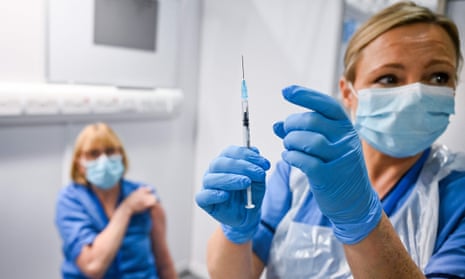The health secretary, Sajid Javid, has confirmed that NHS staff will have to be vaccinated against Covid in a bid to address the 103,000 personnel who have not yet had a single dose. The move will finally bring frontline healthcare workers inline with care staff who have to be immunised by this Friday or risk losing their jobs, although NHS staff will have until next April in the hope of avoiding a mass winter exodus. Unions and some doctors’ organisations have voiced strong opposition.
In some ways, it is remarkable that requiring NHS staff who have face-to-face contact with patients to be vaccinated is even controversial. Healthcare workers have a professional duty of care not to harm patients, which is why the majority have already taken the vaccine, and few could expect to remain unvaccinated in a pandemic and to keep working with vulnerable people. However, mandating health measures is not something to be done lightly.
As I’ve written before, workers – especially pregnant women and people from minority ethnic groups – must be given time to overcome fears, as well as paid time off to get the jab and sick leave for any mild side effects. That’s why staff will be offered one-to-one meetings with clinicians if they want to discuss their concerns as they make their choice. But “persuasion” cannot go on for ever. It has been almost a year since health and care workers were first given priority access to the jab. There surely comes a point when we must acknowledge that some staff will never take the vaccine without it being mandatory, and be honest about what we are asking the public to face in the meantime. Medics are not immune to doubting science or guaranteed to put their patients’ wellbeing first. Every request to give staff more time to feel comfortable with being vaccinated is another day that clinically vulnerable people’s lives are put at risk.
It’s important to be clear about what Javid has mandated. No one will be forced to have the vaccine. It is simply that those staff who choose to remain unvaccinated will not have the right to a job on the frontline of the NHS. This is not unprecedented. Staff in some areas of the NHS, such as surgery, are already obliged to get vaccinated against hepatitis B. That’s because it’s widely understood that not taking sensible precautions to prevent passing on a disease to patients would be a form of neglect.
The conversation around mandatory vaccines repeatedly evokes matters of “choice” and “rights”. But it is telling that there is concern in some circles only for the rights of NHS staff but not for those of clinically vulnerable people. Individual liberties, by definition, are often competing but must be balanced fairly. A healthcare worker’s right to be unvaccinated does not trump a clinically vulnerable person’s right to life. Without vaccine mandates, the burden will be placed entirely on clinically vulnerable people who will be forced to choose between risking catching Covid from hospital or skipping vital medical appointments. These are people who have had to shield away from pubs and the office for months or, for some, well over a year. The idea that they can’t feel safe even going to the doctor’s is unconscionably cruel.
We are told repeatedly that such measures will lead to staff shortages across the NHS, but this is largely a distraction from longstanding causes. While it is true that obliging care staff to have a jab will unfortunately see a small minority quit, it has successfully led to a sharp rise in vaccination rates in the sector. Besides, staff shortages were an issue years before the pandemic because of underfunding and immigration rules. Those who are concerned about staff shortages would be better arguing for higher pay and better conditions.
The myth that “patients are jabbed so no one else needs to be” is another straw man. Some clinically vulnerable people can’t have the vaccine because of their illness, while others will receive insufficient protection from the jab because they’re taking certain medications or because they have weak immune systems. That’s why it’s so important for frontline health workers to be vaccinated; multiple studies show it significantly reduces the risk of transmission. We don’t stop making seatbelts compulsory in cars because some people still die in accidents. Many lives are saved by them, and that’s enough reason for us all to wear them.
It would be easy to see all this as an abstract ideological matter, but it is about real people and real danger. Two-thirds of all coronavirus-related deaths in the UK have been disabled people and hospital-acquired Covid has led to the deaths of at least 8,700 inpatients in England since the pandemic began. It is perhaps reflective of the low value we put on disabled and older people’s lives that it is even a debate that society should take every measure possible to protect them.
Nobody would wish mandatory vaccines as a first step, but it is a reluctant necessary step in an unprecedented crisis. Critics who continue to argue that health workers should have the right to do their job unvaccinated must at the very least admit the consequences: vulnerable people will be put at risk. NHS workers have every right to turn down the vaccine – but they do not have the right to endanger their patients’ lives.

